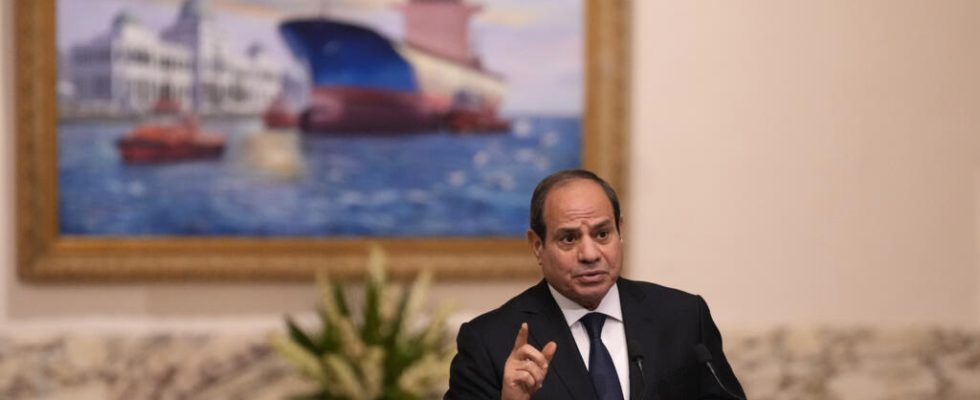Starting this Sunday and for three days, Egyptians are called to the polls to elect their president. Abdel Fattah al-Sissi is assured of being re-elected in the first round with an overwhelming majority. But for the outgoing president, the stakes lie elsewhere.
4 mins
The main issue is the participation rate. Will we do better than the 40% in 2018? To avoid absenteeism, all means are good. The carrot with vouchers distributed to voters in disadvantaged neighborhoods and villages. Administration and public buses that take employees to the polling station. There is also the stick with the threat of a fine. Stratagems used by all regimes for 70 years. Nothing new with calls for boycott either.
Read alsoPresidential election in Egypt: “A formality for President al-Sissi”
The participation of Ahmad al-Tantawi, an unexpected young opponent, could have added a little salt to the process. But that would not have changed the result, just like the three other official candidates belonging to the approved opposition, reports our correspondent in Cairo, Alexandre Buccianti.
Discontent of the population
At a time when we are voting for a new six-year term for President Abdel Fattah al-Sissi, many Egyptians are in any case unhappy with their daily lives. A discontent which is cautiously expressed on social networks. No one, in fact, wants to find themselves in prison like thousands of people convicted of “ spreading false information ” Or ” association with a terrorist organization », the Muslim Brotherhood.
We are still experiencing the worst decades in terms of human rights violations in Egypt, in terms of the number of political prisoners, in terms of continued forced disappearances, in terms of censored freedom of expression, arrests of journalists, blockades of information websites…
Mohamed Lotfy, director of the Egyptian Commission for Rights and Freedoms
The main cause of discontent is the dizzying rise in prices. Onions and potatoes have quadrupled in price, housewives complain. There are also shortages like sugar that you can’t even find at double the price. Many medications have also disappeared. Going to the dentist can be very painful due to the lack of anesthetics. There are also systematic power cuts which, with few exceptions, hit towns and villages on a daily basis, not forgetting Internet outages. But most Egyptians, burned by the 2011 revolution, still prefer to endure rather than risk chaos.
An economy in free fall
There is therefore little enthusiasm for this election even though the challenges are immense. The main challenge is economic. The Egyptian pound has lost 50% of its value against the dollar. A dollar worth almost double the official rate on the black market. As a result, inflation is almost at 40%. This makes the daily life of retirees difficult and unbearable for the third of Egyptians who live below the poverty line. Furthermore, the private sector continues to contract and public subsidies disappear one after the other.
Read alsoWhy the Egyptian economy is in critical condition
At the same time, the reforms requested by creditors are slow to come. After years of generosity, Gulf countries want a return on investment or threaten to withdraw. As for the International Monetary Fund, after having approved a new loan of three billion dollars, the institution is waiting to be able to carry out its missions in this country, one of the most exposed in the world to the risk of payment default. As a result, only the first tranche of the loan has so far been paid, the next one having been suspended since March.
And then, remittances from Egyptians working abroad melted away. They are often vital for the survival of families. But also for the Egyptian state which draws taxes from it. However, this money no longer passes through official channels. Workers preferring to go through the black market.
Guarantor of regional stability in the midst of the Israel-Hamas war
In the midst of the Israel-Hamas war, the challenge for Abdel Fattah al-Sissi is also to reposition Egypt, a country bordering Gaza, as an essential actor in a conflict which has completely eclipsed the issues of this presidential election. The outgoing president can boast of playing a central role in this conflict. With in particular a usual mediator role between Israel and Hamas, which made it possible, this time, to free Israeli hostages and to deliver humanitarian aid to Gaza.
However, the Egyptian president has not opened the doors of his territory to the Palestinians. Concerned not to support a forced displacement of Gazans towards Egypt, but also to preserve internal balances. Abdel Fattah al-Sissi does not want an influx of refugees which would weigh on the Egyptian population, in the midst of an economic crisis. He also fears the arrival on his soil of elements of Hamas, traditionally affiliated with the Muslim Brotherhood, which he has been fighting since taking power ten years ago. In North Sinai, the Egyptian president claims to have gotten rid of jihadist and terrorist groups. He now poses as the guarantor of regional stability, at the cost of an uncompromising security policy in his country.
